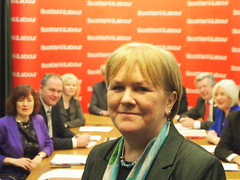Scottish Labour after a Yes vote
Scottish Labour seem to be spending all their resources on attacking the SNP in every way possible and on spreading fear and uncertainty about the prospect of Scottish independence. We haven’t heard much about their visions for Scotland after 2014, no matter whether we vote Yes or No, apart from their determination to introduce university tuition fees and possible also prescription charges.
However, I hope and believe they’ll change after a Yes vote. Here’s how I imagine the process would work:
The day after the referendum (autumn 2014) — Scottish Labour press conference with Johann Lamont, Alastair Darling and the Scottish members of the shadow cabinet in Westminster, Douglas Alexander, Jim Murphy and Margaret Curran. They declare that although they’re disappointed with the result, they will respect it, and they will work with the SNP and other Scottish parties to achieve the best possible deal for Scotland in the independence negotiations. Douglas Alexander, Jim Murphy and Margaret Curran resign from the Shadow Cabinet.
Late 2014 — Scottish Labour sever all ties to rUK Labour.
Late 2014 — The Scottish independence negotiation teams are announced. The SNP’s Nicola Sturgeon will head the main team, but Labour politicians get to lead several of the important teams, in particular Douglas Alexander who becomes the head of the foreign affairs team and Jim Murphy who is put in charge of the defence negotiations. Several Liberal Democrat and Conservative politicians also get chosen to lead negotiation teams.
Late 2014 — Several Scottish MPs announce they will apply for rUK citizenship and stand for Westminster seats in England. At the same time, some Scottish MPs representing English seats declare their intention to move back to Scotland and try to get into the Scottish Parliament in 2016.
Late 2014 — A few Labour MSPs give up their seats “for health reasons”. Douglas Alexander, Jim Murphy and Margaret Curran decide to contest these seats. They are duly elected without too much trouble.
Early 2015 — Johann Lamont decides to resign as leader of Scottish Labour because her leadership was too closely tied to the failed Better Together campaign. Douglas Alexander, Jim Murphy and Margaret Curran all decide to run for leader. After an intense campaign, Jim Murphy becomes the new leader of Scottish Labour. [I’m not implying here that Jim Murphy is Labour’s best politician, but he happens to be my local MP.]
7 May 2015 — Westminster elections. By common consent, all main parties in Scotland decide not to put up challengers to the incumbents, given that independence is now only a year away.
April 2016 — Scottish Labour launch their manifesto for Scottish Parliament elections. Now that they can develop their own policies without undue interference from London, they’re suddenly against tuition fees and prescription charges again.
1 May 2016 — Independence Day.
5 May 2016 — Elections to the Scottish Parliament. The winner is unexpectedly Labour, and Jim Murphy becomes Prime Minister of the Kingdom of Scotland.

Interesting postulation, though I think reality will be completely different regarding Scottish Labour if Scotland gains independence. There will hopefully be no space for washed out and bitter SLAB and Scottish Westminster Labour MPs. Some fresh and new figures will come through from the Scottish Labour for Independence group, there is talent aplenty that can be tapped into there, and no doubt more will join as the referendum vote draws near, and they will more likely be trusted to tell the truth, and be given respect by the electorate. I would imagine though, that it will be a good few years as a party of opposition before a new Scottish Labour party in an independent Scotland will be trusted enough by the electorate to be given a chance at government.
I’m sure you’re right that it’s rather likely it’ll be a good few years before Labour will gain power in an independent Scotland. However, nothing is certain in politics, so it is quite possible Labour would gain power sooner than expected. Which is why it’s important for Labour to tell us what their policies would be in an independent Scotland, not just that they’re against it.
I wouldn’t trust the ‘refugee’ politicians that flood back to Scotland. I certainly wouldn’t vote for them at the moment. Now, if they fight a fair campaign against independence, without the lies and scare stories then that is another matter.
It is an interesting thought, but it would require labour to be entirely rational and thoughtful about its future. The truth is it has become deeply unhinged after the SNP win in 2007. Its campaign for the Union has led it down a very dark road indeed, and sad to say I can’t see it survive except as a rump party with no real voice in Scotland. I would expect it to tear itself to pieces in the aftermath of a yes vote. Something will emerge and mostly like fail at the polls for the first true Scottish parliament.
It could generations before Scotland could embrace a true labour party and it would be nothing like it is now.
Its the same fate that awaits the Tories and the lib-dems.
My feeling is that the Greens will slowly become the new left of centre party in Scottish politics.
To be perfectly honest, I’ve no idea what the political landscape will look like after independence. Even if Labour survives, I don’t know whether they’ll end up to the right or to the left of the SNP — and that’s assuming the SNP survives, too (it could quite easily split into two parties post-independence). There are so many unknowns that it will probably depend on personalities and specific policies in the end. The only thing I’m certain of is that Scotland will be even more different from the rUK afterwards than is already the case.